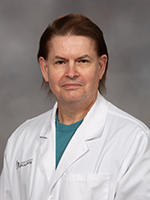Robinson to lead CCRI clinical trials program
Dr. William Russel “Rusty” Robinson has joined the University of Mississippi Medical Center Cancer Center and Research Institute as a professor in gynecologic oncology and hematology/oncology and to lead its cancer clinical trials program.

Robinson, recently the Maxwell E. Lapham Professor and Section Chief of Gynecology Oncology and director of the Office of Clinical Research at Tulane Cancer Center, is nationally recognized in gynecologic oncology and in his research areas of health disparities and education.
“There are some opportunities here to improve cancer care in this region that don’t exist anywhere else, he said. “This state and institution are committed to improving cancer care in the region and put their money where their mouths are.”
Robinson currently serves on the National Cancer Institute’s NRG Oncology Group, a group that helps format and oversee cancer clinical trials for patients. Within the NRG, he co-chairs a working group that is seeking to eliminate ethnic disparities in cancer clinical trial enrollment.
His research interests are in cancers of women’s reproductive systems and health disparities and education.
At CCRI, he’ll oversee research efforts to offer clinical trials most needed in this region, ensure messaging about clinical trials reaches all oncologists and ethnic groups and work with patients.
He praises his colleague, Dr. Mildred Ridgway saying “I want to enhance what she is doing well and enhance the cancer program overall.”
Much of his work will be with the cancer clinical trials programs, where he said he will initially focus on:
- Increasing opportunities for minorities to participate in trials. Since not all medications work in every ethnic group the same way, clinical trials, which often pair a known treatment with a new one, offer better chances of finding out how and for whom the medication will work before the drug enters widespread use.
“We know there are differences at the molecular level associated with ethnicity but we don’t fully understand them,” he said.
- Eliminating problems that hinder clinical trial participants such as travel. “You’ll end up spending more time here and doing more things than if you’re not in a clinical trial,” he said. While most patients like the additional time with their medical team, the travel can be tiring and off putting.
- Eliminating financial issues. “Clinical trials require more effort from the investigator and facility and in a sense from the patient. How do we do that in an era of limited finances?” he asked. The brunt of that burden rests with the cancer center, but patients and their caregiver may spend more time away from work and expense in traveling to and from UMMC.
- Working to make CCRI a NCI Community Oncology Research Program, or NCORP, site which could collaborate with private practice oncologists on many clinical trials. “This would give them the opportunity to participate in NCI clinical trials that they wouldn’t ordinarily have access too,” said Robinson, saying the 11 years he spent in private practice in Texas will be valuable in starting that outreach.
“Dr. Robinson, or Rusty as he is known to his friends, will be a great addition to the Cancer Center,” said Dr. John Ruckdeschel, CCCRI director. “He has worked in the clinical and translational research space and is well known in national cooperative group circles. He will greatly expedite our pathway to NCI designation.”
Robinson’s work ties into the CCRI efforts to gain NCI designation, which would bring additional research dollars to Mississippi.
The challenge of helping attain NCI designation was a big draw, he said.
Work toward that designation will help improve services and bring additional resources to the region.
“A lot of the pieces are already here,” he said. “The trick is going to be putting them in the right package to make them attractive to the NCI.”


